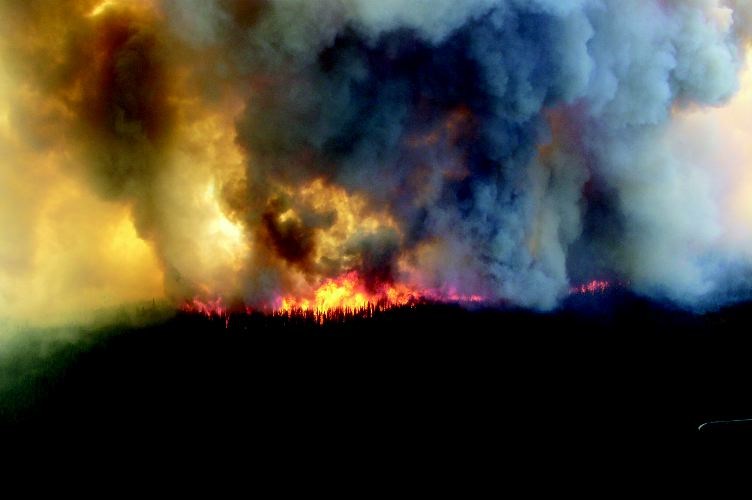As more than 560 wildfires burn across B.C. and most of the province is blanketed in smoke, local governments in the Interior are appealing to the federal and provincial governments for help to protect their cities from future fires.
The appeals come in the form of resolutions that will be presented at this fall's Union of B.C. Municipalities conference.
The Thompson-Nicola Regional District wants to see the province provide funding to rural and First Nations re brigades and departments for emergency training, equipment and response capacity with respect to rural-urban wildfires.
Regional district chair John Ranta said a number of small fire brigades that have lost their funding in recent years due to provincial policy changes and liability concerns are at risk of shutting down.
These firefighters - sometimes just one person with a hose and a water tank on the back of their pickup truck - are on the ground and can deal with a fire before it gets out of hand.
"It certainly puts houses and people at risk in the rural areas if they do shut down - I hope they don't," Ranta said. "No one is doing bake sales these days to support a fire department. The province should be funding the rural brigades because they do provide a valuable service."
On August 24, during a visit to Prince George, Prime Minister Justin Trudeau acknowledged that there are gaps in resources for municipalities, which work with the province, and First Nations, which are a federal responsibility. He said more work needs to be done to make sure everyone is equally protected.
"Hopefully, his comments will be taken by the staff representatives in the federal government
and result in some liberation of funds, but there's only so much funds and so much capacity for the taxpayer to accommodate the needs of the public," said Ranta.
Quesnel believes "very little has been done to actually protect rural communities from the threat of wildfires" since the 2003 Filmon Firestorm Report and says communities are at a greater risk every year from "catastrophic" wildfires.
It says the fundamental weakness in the current approach to protecting rural communities is the fact that responsibility for managing and treating Crown forest land has been downloaded to local governments.
Quesnel said in its resolution that the province should develop community wildfire protection plans, fuel management prescriptions for the wildland-urban areas and fuel management treatments in collaboration with local governments.
"We shouldn't be waiting for local governments who don't have expertise or jurisdictional authority or resources to take the lead, only to hand it to (the province) to become the permitting and approval agency. That doesn't make any sense at any level," said Quesnel Mayor Bob Simpson. "It's Crown land, manage your Crown land."
Simpson said there is another solution that involves the province issuing licences that would make municipalities tenure holders for Crown land and allow them to do necessary mitigation work. He said they would get revenue from logging and be eligible for funding to manage the forest.
"The resolution speaks to probably the most elegant, simplistic way to deal with the problem," Simpson said.
Burns Lake agreed with Quesnel that downloading the cost, responsibility and expertise of wildfire mitigation on Crown land, areas surrounding local governments and land inside local government boundaries creates unnecessary pressure on local government finances and resources.
It said the federal and provincial governments should take responsibility for mitigation costs in those areas.
Williams Lake said the UBCM should lobby the province to make changes to its wildfire mitigation practices that allow for increased spacing of fibrestands, prescribed burning, larger fuel breaks around residential communities and other methods to lessen susceptibility to "mega-fires" and better protect people and assets.
"There's not enough flexibility in some of the forest practices that allows us to protect our communities," said Williams Lake Mayor Walt Cobb. "They've decided this is the way we manage our forests and we're trying to get the message out that their practices aren't working."
He admitted there have been resolutions endorsed by UBCM in the past calling for more effort on the province's part to mitigate fire risk with little result, but he hopes this year the province's response is different.
"Maybe the government is finally listening because of the fires," he said. "I would be very surprised, particularly this year when the fires are so horrendous for the second year in a row, that we get any kind of opposition to them."
Williams Lake is also proposing that the federal and provincial governments and the Insurance Bureau of Canada provide incentives to property owners and agricultural land owners to reduce the amount of forest fire fuel on their land.
Cobb said removing trees and other flammable brush can cost property owners money and require permits or licences, so there is little motivation to use FireSmart initiatives beyond self preservation.
"If I'm going to make my home and my yard fire smart ... the cost is so exorbitant that I can't afford to do it," Cobb said.
Other resolutions concern timely reimbursement of firefighting costs, maintaining current inventory listings of local firefighting resources and sending provincial incident commanders to small communities during emergency events.



